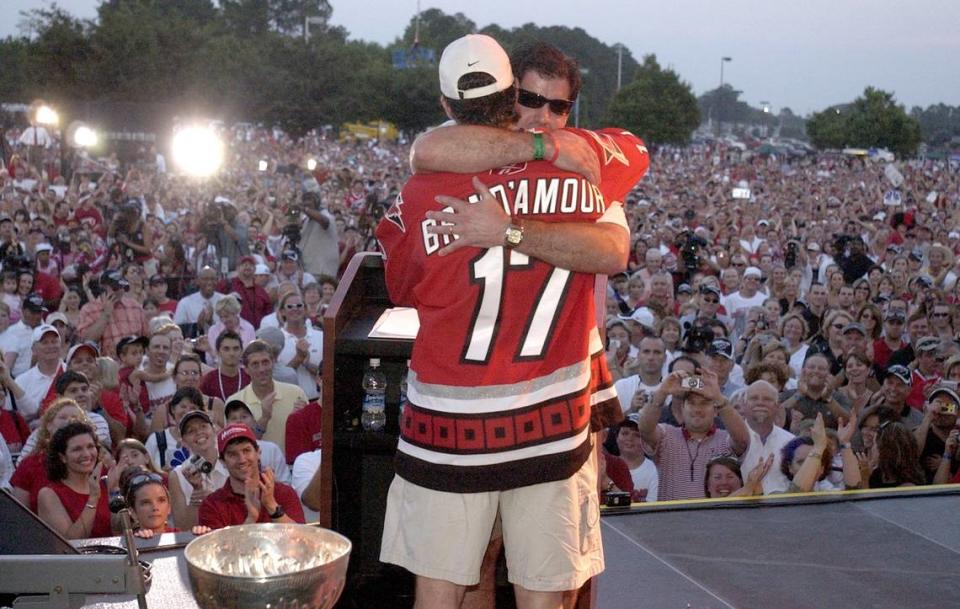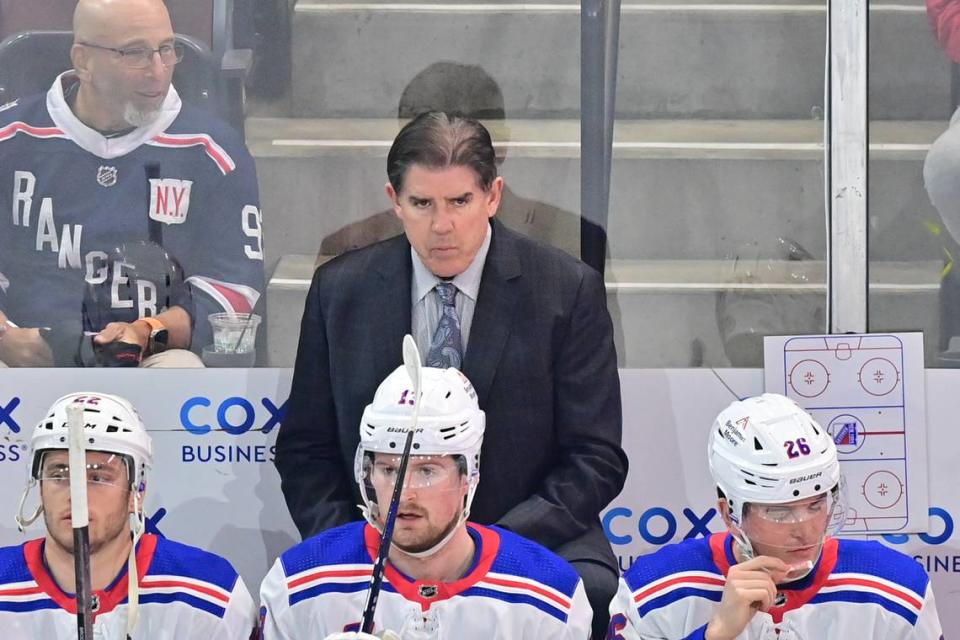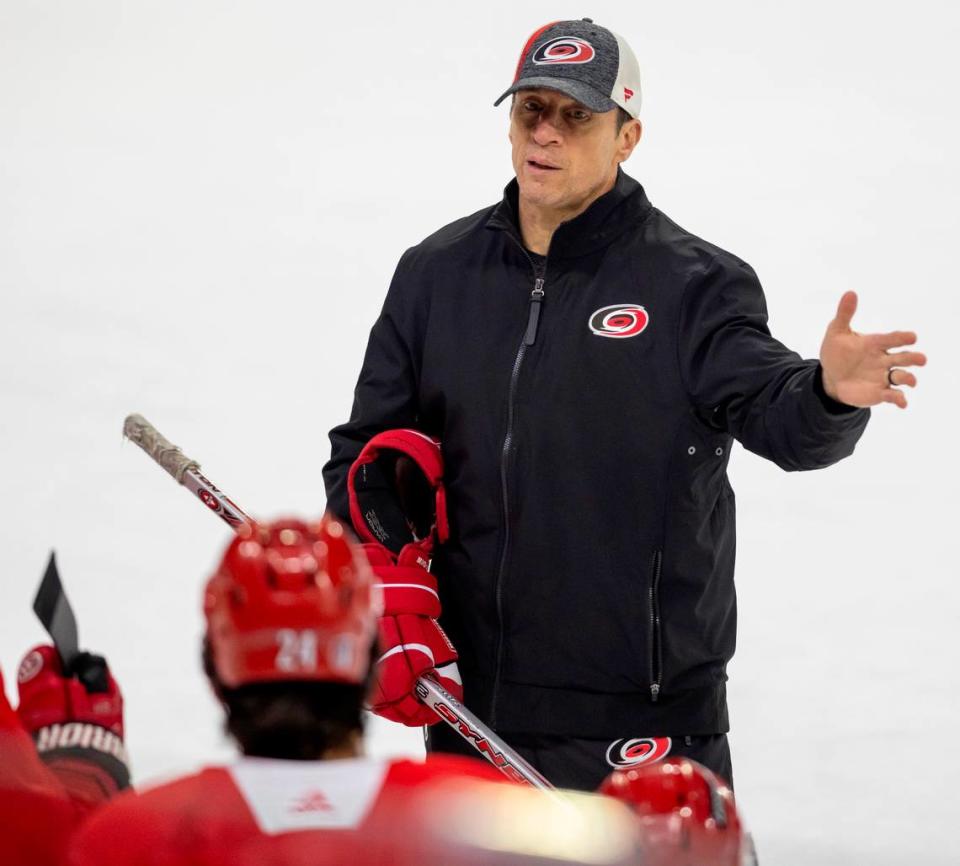How the Hurricanes’ Stanley Cup-winning coach, captain became winner-take-all rivals
The quintessential mind-meld moment between Peter Laviolette and Rod Brind’Amour came at one of their lowest points. The Game 6 loss in Edmonton in 2006 was one of the Carolina Hurricanes’ worst performances of the season, never mind the playoffs, a complete and utter disaster that pushed the team to the brink of blowing a 3-1 lead with the Stanley Cup within reach.
Laviolette had his talking points in mind when he prepared to speak to the team immediately afterward, and when he walked into the dressing room, he saw Brind’Amour standing up to speak. Laviolette turned around and left the room.
The rest is history. Brind’Amour’s speech catalyzed the Hurricanes, who won Game 7 two days later in Raleigh to clinch the Stanley Cup, and that moment of mutual understanding was perhaps the apogee of an unusually close relationship between captain and coach that helped capture a championship.
“I remember standing up and as I got up I saw Peter start coming in and then I saw him turn around and head back to the coaches’ office,” Brind’Amour said in 2016, recalling the scene. “That made it right, that it was my time to stay something.”
“I can tell you if Roddy stood up and said something, it would have more impact than anything anyone else could say, including myself, because of the person he is,” Laviolette said then.

Eighteen years later, both are behind the benches of Stanley Cup contenders and only one will be moving on. Laviolette, in his first year with the New York Rangers, has done what he has done almost everywhere he has been: Get the most out of the talent at his disposal at first asking. Brind’Amour, meanwhile, has the Hurricanes in the playoffs for the sixth straight year, building a legacy of consistent competitiveness that even Laviolette couldn’t match in Carolina.
“You take from everybody, the good and the bad,” Brind’Amour said. “Definitely with ‘Lavy,’ my memories are good. I think he did a great job of letting the players be themselves and giving them confidence in their abilities. You see that every time he goes somewhere new, it seems like there’s a big push there. And he obviously knows his stuff, that kind of goes forgotten, but to me it’s all the other stuff, empowering his players.”
The similarities outnumber the differences: Brind’Amour adopted and even enhanced Laviolette’s straight-ahead, high-pressure style; he has leaned on captains Justin Williams and Jordan Staal the same way Laviolette leaned on him; and he has found ways to motivate different players differently, tapping into their personalities and strengths and weaknesses the same way Laviolette did so adeptly in 2006.
Both in strategy and tactics, in the big picture and the small, there are so many dots to connect.
“They really both empower players very, very well,” Williams said. “That’s why players tend to love playing for them. They feel good about themselves even when they’re being corrected. I’d like to look at how many guys have had career years under these two guys.”

They have built their staffs the same way, surrounding themselves with people they know well. Jeff Daniels was a teammate of Brind’Amour’s with the Hurricanes before he became a Laviolette assistant in Carolina; Tim Gleason was a teammate as well. Laviolette’s staff in New York all worked with him or played for him previously.
Kevin McCarthy was once one of them. He was the other assistant coach alongside Daniels in Carolina in 2006, making a seamless transition from Paul Maurice’s staff when Laviolette arrived in 2003, then spending the next 20 years alongside Laviolette in Philadelphia and Nashville and Washington. He could have joined Laviolette with the Rangers, but retired to High Rock Lake instead.
“I love both those guys,’ McCarthy said. “it’s going to be a tough one to watch. I’ll be like a parent watching two of his kids in the same game.”
McCarthy can see the similarities in their styles, and their approaches, and their philosophies, how they relate to players and how they interact with their staffs. But if there’s one key element Brind’Amour took from Laviolette, it’s the culture they believe leads to success and how they try to build it.
“That’s one thing both Lavy and Roddy value,” McCarthy said. “They try to create that family atmosphere. At the end of day, to win a championship, you have to have players willing to do it for the guy next to him. Both coaches bring their teams together on and off the ice. It goes a long way. It really does. Sometimes that can be the difference-maker in the playoffs when there’s not a lot of difference between teams.”

Which isn’t to say Brind’Amour is purely a Laviolette disciple. His style is a melange of several coaches he played for or worked for, not just Laviolette but Bill Dineen and Paul Holmgren and Maurice. The Hurricanes are one of a handful of NHL teams that play exclusively man-to-man in their own end, as opposed to zone or a man-zone hybrid like the Rangers, an example of Brind’Amour crafting his philosophy based on whatever he found hardest to play against.
“Roddy is his own person and he developed his own style,” Williams said. “At the end of the day, he’s looking at the other side of that bench and he’s not thinking he’s an understudy. He’s built his own and created his own and he believes in his players and that we have the better team and we’re going to win.”
This is not the first meeting of coach and former captain, of mentor and careful observer, on such a big stage. Last year’s Stadium Series between Laviolette’s Washington Capitals and Brind’Amour’s Hurricanes was under a similar spotlight, if not for the same stakes.
But for two people whose only taste of ultimate success was so closely tied to each other, and whose coaching styles are built on many of the same basic precepts, it will be fascinating to see what happens when their futures are diametrically opposed, winner-take-all.
Never miss a Luke DeCock column. Sign up at tinyurl.com/lukeslatest to have them delivered directly to your email inbox as soon as they post.
Luke DeCock’s Latest: Never miss a column on the Canes, ACC or other Triangle sports

 Yahoo Sports
Yahoo Sports 
